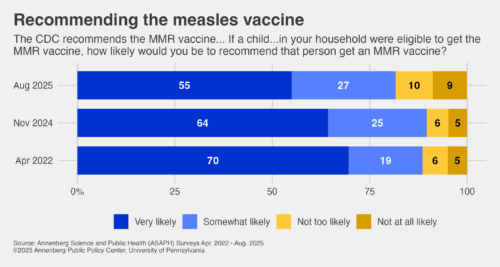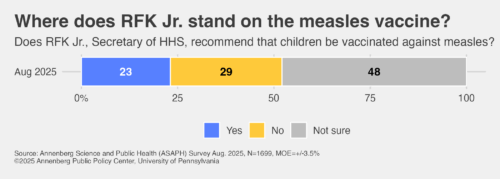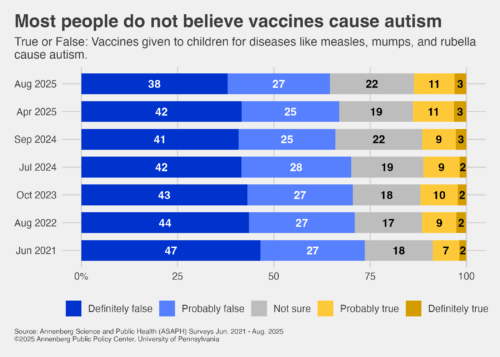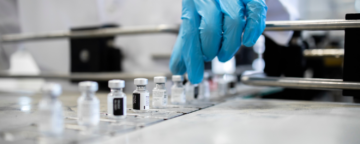Nearly 1,650 cases of measles in 42 states have been confirmed this year in the United States by the Centers for Disease Control and Prevention (CDC), the largest annual number in 34 years. This includes a fresh outbreak of over a hundred people that began in late summer in Arizona and Utah. Public health experts such as Dr. Paul Offit, director of the Vaccine Education Center at Children’s Hospital of Philadelphia, suspect the actual total could be higher.
The outbreaks come over two decades after measles was declared “eliminated” from the United States in 2000, a status that signifies the absence of “the continuous spread of the disease” for more than 12 months, the CDC says, thanks largely to a “highly effective vaccination program.”
After decades without many cases, however, and several years in which the safety of new Covid-19 vaccines and others have been called into question, an Annenberg health survey finds that the public is less informed than it should be of the dangers of measles – a highly contagious disease that can lead to death or disability – and less certain than it used to be of the value of vaccination.
The survey by the Annenberg Public Policy Center of the University of Pennsylvania shows that while most U.S. adults (82%) would recommend that eligible children in their household get the MMR vaccine, which protects against measles, mumps, and rubella, the percentage has declined significantly since November 2024 (90%). The survey also finds that:
- The public is confused about whether the top U.S. health official, Health and Human Services Secretary Robert F. Kennedy Jr., recommends that children be vaccinated against measles;
- Most Americans believe that vaccines like the MMR vaccine do not cause autism – but significantly fewer know this than in recent years;
- Over half of those surveyed are not sure whether a mercury-based preservative in some vaccines affects a person’s chances of developing autism, when evidence has shown no link between the preservative and autism;
- A quarter of the public thinks getting the measles is likely to be less deadly than it is.
“Mixed messages about the safety and efficacy of measles vaccination from those leading health agencies fuel confusion and cultivate a climate that is hospitable to an otherwise preventable and sometimes deadly disease,” said Kathleen Hall Jamieson, director of the Annenberg Public Policy Center (APPC).
The survey was conducted August 5-18, 2025, among nearly 1,700 U.S. adults on a nationally representative panel. See the end of this news release or the topline for additional details.
Views on the MMR vaccine
The survey finds that most American adults know…
… What MMR prevents: Given the choice of a number of different diseases and conditions that begin with the letters “M” and “R,” around two-thirds of those surveyed know that the MMR vaccine is designed to prevent measles (68%), mumps (65%), and rubella (64%). As many or more people correctly did not select alternatives such as meningitis (66% did not select), mpox (68% did not select), rhinitis (69% did not select), menopause (70% did not select), and rigor mortis (70% did not select). However, more than 1 in 4 people (27%) overall say they are not sure what the MMR vaccine is designed to prevent.
… Vaccination is the best way to avoid getting measles: Given the options of vaccination, a healthy diet, or neither, a strong majority knows the best way to prevent getting measles is to be vaccinated (81%), while 1% say “eating a healthy diet,” 6% say neither, and 11% are not sure.
… The MMR provides lifetime protection against measles: Most people (67%) know it is true that the MMR vaccine usually protects people who receive it from getting measles for their entire lifetime, though 21% are not sure and 13% think this is false. The CDC says the MMR vaccine usually protects people for life against measles and rubella, though immunity against mumps may diminish over time.
Giving children the MMR vaccine
The CDC recommends that children get a first dose of the MMR vaccine at 12 to 15 months old and a second dose between ages 4 and 6 years old. The CDC says one dose is 93% effective at preventing measles and two doses are 97% effective.
Recommending MMR for a child: Although a large majority of people support giving children the vaccine, the number declined significantly in just over nine months. The August 2025 survey finds that 82% would recommend that an eligible child in their household get an MMR vaccine, compared with 90% in November 2024.
Why childhood measles is less common than a century ago: A majority (77%) knows that “the main reason” children in the United States are much less likely to get measles today than a century ago is effective vaccination, rather than better sewage treatment and water purification (4%) or better nutrition (2%), though 13% say they are not sure and 3% say “none of the above.”
Two doses: Less than half of those surveyed (42%) know children need two doses of the MMR vaccine for full protection from measles, mumps, and rubella, while 48% are not sure.
RFK Jr. and the measles vaccine
The American public is unclear about where Health and Human Services (HHS) Secretary Robert F. Kennedy Jr., a longtime critic of vaccines, stands on the MMR vaccine. Less than a quarter of the public (23%) says that he recommends that children be vaccinated against measles, while 29% say he does not recommend it, and almost half of the public (48%) is not sure.
In January confirmation hearings for HHS secretary, Kennedy “refused to say that vaccines do not cause autism – despite a large body of evidence showing there is no link,” according to FactCheck.org, a project of the Annenberg Public Policy Center. In fact, Kennedy “also pointed to a flawed paper to suggest that there is credible evidence to claim vaccines cause the disorder.”
According to the CDC: “There is no link between the MMR vaccine and autism.”
As secretary, Kennedy has made misleading and unsupported claims about the MMR vaccine, the measles, and vaccination in general. He has downplayed the risks of measles and this year’s large measles outbreak in Texas. FactCheck.org has reviewed a number of his claims on various issues – see its articles.
Last spring, during the Texas outbreak, Kennedy did make positive statements about vaccination. On April 6, he wrote on X (formerly Twitter), “The most effective way to prevent the spread of measles is the MMR vaccine.” In an April 8 CBS interview, he said, “We encourage people to get the measles vaccine.” Yet Kennedy also said, “We don’t know the risks of many of these products because they’re not safety tested.”
As FactCheck.org writes, hours after his post on X, Kennedy praised two Texas physicians as “extraordinary healers” for using two unsupported treatments for measles. On March 2, Kennedy wrote on Fox News that vaccines “not only protect individual children from measles, but also contribute to community immunity…” But as FactCheck.org also notes, he did not explicitly say the vaccine is safe, nor did he specifically advocate vaccination.
During the Texas outbreak, Kennedy suggested that poor nutrition and a lack of exercise play a role in measles and misleadingly focused on vitamin A, including from cod liver oil, as a treatment. Even so, nearly 4 in 5 Americans (79%) know it is true that “healthy, well-nourished children can get measles.” Just 7% think that is false and 14% are not sure.
A CDC page dated January 17, 2025, (accessed Oct. 27) states: “The best way to protect against measles is to get the measles, mumps, and rubella (MMR) vaccine. Children may get the measles, mumps, rubella, and varicella (MMRV) vaccine instead, which protects against chickenpox too.”
Most see no link between vaccines and autism
No evidence vaccines cause autism: About two-thirds of the public (65%) say it is false to claim that vaccines given to children for diseases like measles, mumps, and rubella cause autism, though that represents a significant decrease from prior years (June 2021-July 2024), when 70-74% of the public agreed it was false to link autism with vaccines. In 2004, the National Academy of Medicine (then named the Institute of Medicine) determined that “the body of epidemiological evidence favors rejection of a causal relationship between the MMR vaccine and autism evidence.” The CDC, on a web page dated Dec. 20, 2024 (accessed Oct. 29), wrote that “studies have shown that there is no link between receiving vaccines and developing ASD” (autism spectrum disorder).
Vaccines are safe: A substantial majority of the public (70%) similarly says that vaccines approved for use in the United States are safe, though that also represents a decline from past years (April 2021-January 2022), when 76-79% said vaccines are safe.
No evidence of an autism-thimerosal link: Thimerosal, a mercury-based preservative used in some vaccines since the 1930s, has been the target of unfounded and misleading claims by anti-vaccine advocates, including claims that it is ineffective, a neurotoxin, and may be tied to autism. In its 2004 report, the National Academy of Medicine determined that evidence “favors rejection of a causal relationship between thimerosal-containing vaccines and autism.” Numerous studies since have also supported thimerosal’s safety, according to FactCheck.org. Thimerosal has not been in childhood vaccines other than flu vaccines since 2001. In July 2025, Kennedy signed off on recommendations by the CDC’s Advisory Committee on Immunization Practices to remove thimerosal from U.S. flu vaccines.
Asked about any connection between thimerosal and autism, half of those surveyed (51%) are not sure whether thimerosal increases, decreases, or has no effect on the chances that a person getting a vaccine will develop autism. Over a third (37%) correctly say it has no effect on the chances of developing autism, and 10% say it increases the chances.
- To learn more about autism and the challenges it may pose for young people, see “If Your Adolescent Has Autism: An Essential Resource for Parents” (Oxford University Press, 2025), a new book in a series developed by the Adolescent Mental Health Initiative. The initiative is a joint project of the Annenberg Public Policy Center and The Annenberg Foundation Trust at Sunnylands under the guidance of Patrick E. Jamieson, director of APPC’s Annenberg Health and Risk Communication Institute.
Knowing about the consequences of getting measles
Most Americans have little firsthand experience with measles, which, as noted above, was declared “eliminated” from the United States in 2000, according to the CDC. If current trends hold, however, “there would appear to be grounds for the U.S. to lose measles elimination status,” according to KFF researcher Josh Michaud. The survey finds that many Americans are unsure about the possible consequences of getting measles:
- Only 22% correctly know that some people experience a swelling of the brain, known as encephalitis, as a result of having measles. A small number (3%) say you can get encephalitis from the measles vaccine, which is extraordinarily rare. Ten percent say you cannot get encephalitis from measles or the measles vaccine, 6% say you can get it from both, but most people (60%) are not sure.
- Less than a third (30%) know that getting measles increases the chances of getting some serious illnesses later in life, while 24% say it has no effect on getting serious illnesses later, 8% say it decreases the chances, and 38% are not sure.
- Most people are not sure how many children die as a result of getting measles (58%) – only 9% correctly know it is about 1 in 1,000, while a quarter of those surveyed (26%) chose lower rates, and 8% chose higher rates. This year’s U.S. outbreaks have so far resulted in three deaths, two of them children.
- About 1 in 5 people (19%) believe that among children who get the MMR vaccine none are likely to die as a result. Half of those surveyed (50%) are not sure, and about a third (32%) chose higher rates. According to the Infectious Disease Society of America, “There have been no deaths shown to be related to the MMR vaccine in healthy people.”
Annenberg Science and Public Health survey
The survey data come from the 25th wave of a nationally representative panel of 1,699 U.S. adults conducted for the Annenberg Public Policy Center by SSRS, an independent market research company. Most have been empaneled since April 2021. To account for attrition, replenishment samples have been added over time using a random probability sampling design. The most recent replenishment, in September 2024, added 360 respondents to the sample. Wave 25 of the Annenberg Science and Public Health (ASAPH) survey, fielded August 5-18, 2025, has a margin of sampling error (MOE) of ± 3.5 percentage points at the 95% confidence level.
Download the topline and the methods report.
The policy center has been tracking the American public’s knowledge, beliefs, and behaviors regarding vaccination, Covid-19, flu, RSV, and other consequential health issues through this survey panel for more than four years. In addition to APPC Director Kathleen Hall Jamieson, APPC’s ASAPH survey team includes research analyst Laura A. Gibson, Patrick E. Jamieson, director of the Annenberg Health and Risk Communication Institute, and Ken Winneg, managing director of survey research.
See other recent Annenberg health survey news releases:
- Vaccinations and pregnancy: Under half in the U.S. would recommend some routine vaccinations during pregnancy (Sept. 30, 2025)
- Mosquito-borne illness: Despite increase in U.S. cases, worry about West Nile virus remains low (Sept. 26, 2025)
- Trust in health agencies and RFK Jr.: Public confidence in U.S. health agencies slides, fueled by declines among Democrats (Sept. 18, 2025)
- Vaccine mandates for school: Most Americans favor MMR vaccine requirements for public school (September 12, 2025)
- Health risks during pregnancy: Public knowledge high on smoking and alcohol risks during pregnancy (July 29, 2025)
The Annenberg Public Policy Center was established in 1993 to educate the public and policy makers about communication’s role in advancing public understanding of political, science, and health issues at the local, state, and federal levels. Connect with us on Facebook, X, Instagram, and Bluesky.





